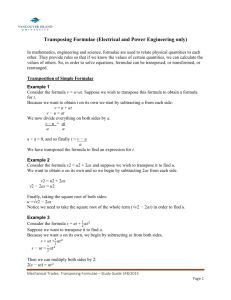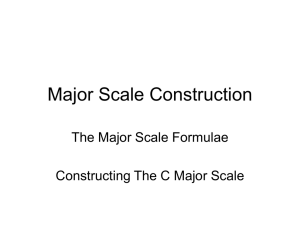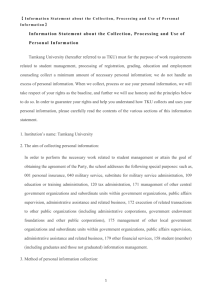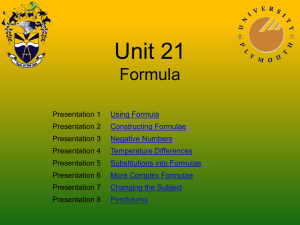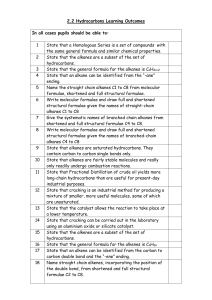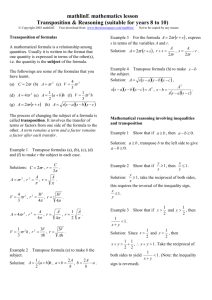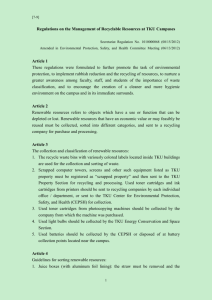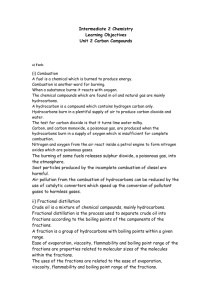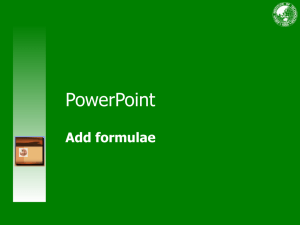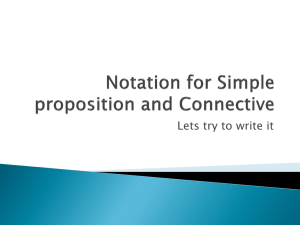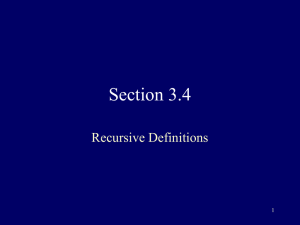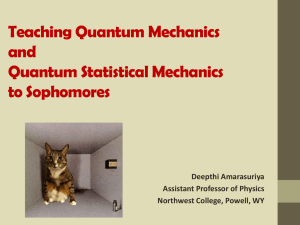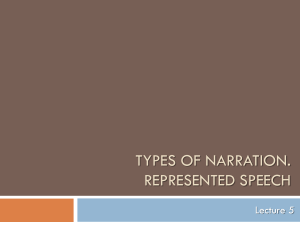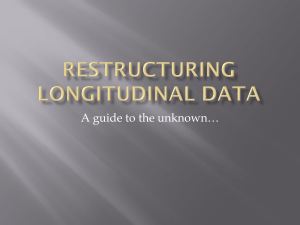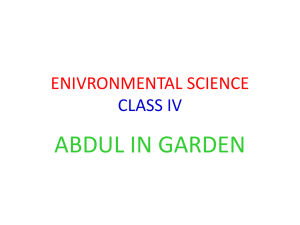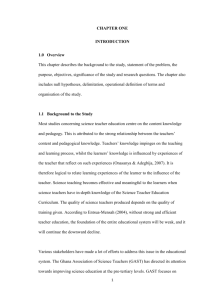AnalyticalTBMath02
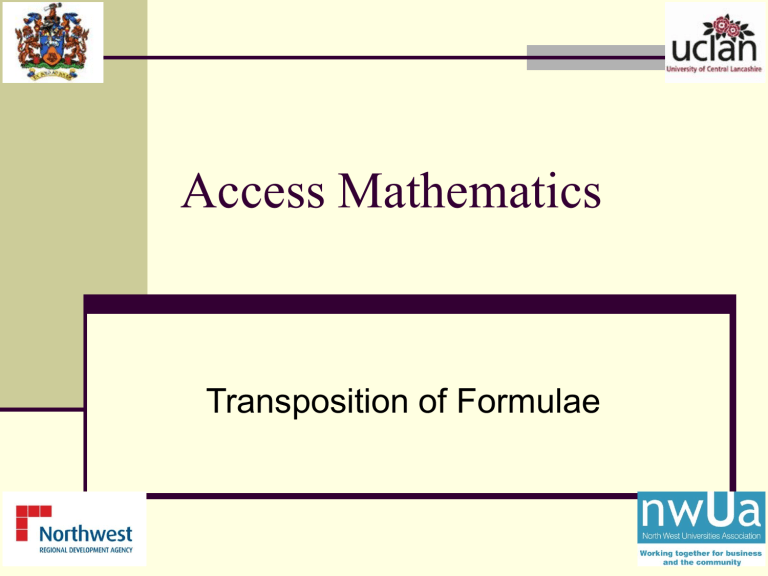
Access Mathematics
Transposition of Formulae
Learning objectives
After this session you should be able to:
Recall simple formulae triangles to model simple engineering systems
Transpose formulae in which the subject is contained in more than one term
Transpose formulae which contain a root or a power
2
Recap: Make x the subject
Last lecture we examined the differences between equations and formulae and their subsequent solution protocols:
Formula:
Equation: gx + h = k
3x+2 = 23 gx + h - h = k - h
3x+2 - 2= 23 -2 gx = k- h
3x = 23 - 2 x = (k - h)/g x = (23-2)/3 x=7
3
Transposition Of Formulae
The rules are exactly the same as for algebra, except the final result is an algebraic expression instead of a numerical answer.
4
Simple Transposition
In the Science units you will come across very simple formulae for instance
Newton’s second law
(mechanics)
Electrical charge
Ohms Law
Density
m
V
F
ma
Q t
V
I
IR
5
Recap: Simple Transposition
Here the same rules apply as the letters in the formulae are just numbers in disguise
V
R
V
IR
;
I
&
R
I
V
I
R
V
I
R
6
Activity
In groups make the subject of the following formulae the variable in parenthesis for:
Density ( m )
Electrical Charge ( t )
Newton’s second law ( a )
m
V
Q t
F
I ma
7
Transposition of Elementary formulae
Mathematical
I
P
PRT
100 P
I
PR
RT
100 R
100 I
PR
100 T
100
T
100 I
PR
I
PRT
; T
100
Systematic
I
PR
T
100
100 I
T
PR
Try this one yourselves:
2 r
c
c
2
r ; r r
c
2
8
Extra terms
Mathematical
v=u+at;t
v -u =u+at -u
v-u=at
(v-u) /a =at /a
t=(v-u)/a
Systematic
v=u+at;t
v -u =at
(v-u)/a=t
Try this yourself but this time transpose for a instead
9
Transposition & substitution
Consider: mv
2
T
r
; r
Tr
mv
2 r
mv
2
T
What if m=2, v=5 and T=10
Use any either of the methods to transpose find the the value of R given that:
H
I Rt .
10
Example:
The pressure p in a fluid of density
at a depth h is given by: p
p
g h
Where p a a is the atmos pressure and g is gravitational acceleration.
Make h the subject p
p a
g h p
p a
g h
p
p a
g
h
11
Group Activities
Work in groups
Discuss the solution for one the following problems
Select a group member to share your solution with the class
v
F
1
P
F
2
; F
1
R
R o
( 1
t ); t
1
P
R
s
b
100 ; b
1 b
R
1
1
R
2
; R
1
12
Class Discussion/Exercise
(a,b) pV
nRT ; P , T
R
r
H
; h h y
mx
c ; m
I
R
V
r
; R
V
h
2
3
2 R
h ;
R
R e
2
R
1
R
1
R
2
R
2 a
2 b
2 a
2
; R
2
; a
2
A
a ( H
h )
bh
cH
; H
2
13
Subjects with Roots or Powers
In these cases we proceed as before isolating the power or the root first
Thereafter we simply us the inverse operation in order isolate the required variable i.e. take the root or raise to the power respectively
e.g.
v
2 u
2
2 as ; u v
2
2 as
u
2
v
2
2 as
u
Try
4 A
r
2
A
r
2
4 r
4 A
14
Transposition inc. Roots/Powers
The same procedure is employed where roots are involved.
However to negate the root we raise to the appropriate power:
E.g.
T
2
L
; L g g
T
2
L
g
2
L
2
T
or
T
2
2
L g
L
g T
4
2
2
Try: v
v
2
2 g h
2 g h ; h v 2
2 g
h
15
Class Exercise
1 ) A
r
2
; r
2 ) E
mc
2
; c
3 ) E
1
2 mv
2
; v
4 ) d
5 ) E
f
A
; A
2
V
;
2 U f
6 ) b
a
2 c
2
; c
7 ) E max
m g h
1
2 mv
2
; v
8 ) k
a
2 b
2
; a
12
9 ) k
10 ) k
1
2
L
2
12
R
2
; L
4
P
2
Q
2
; P
16
Summary
Have you met the learning objectives
Specifically are you able to:
Recall simple formulae triangles to model simple engineering systems
Transpose formulae in which the subject is contained in more than one term
Transpose formulae which contain a root or a power
17
